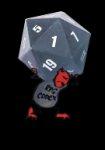
RPG Codex - Warren Spector Interview
RPG Codex's Infinitron & Crooked Bee interviewed Warren Spector about Ultima, Origin, and CRPG Design.
Chroniclers of the history of computer roleplaying games sometimes speak of a period in the mid-1990s when the genre suffered a decline – critically, commercially, and in terms of the sheer numbers of games released. See for instance this article by Rowan Kaiser, or Wikipedia. It's probably not a coincidence that it was around that same time that you moved from Origin to Looking Glass, the latter having been focused on a genre of games that investors and publishers considered more "contemporary". As somebody who was very much at the heart of the industry during that time, can you tell us more about these events? After a Golden Age spanning from the 1980s all the way up to around 1993, how could an entire genre collapse so suddenly, across so many different companies?
There's no doubt RPG's were out of favor by the mid-90s. No doubt at all. People didn't seem to want fantasy stories or post-apocalypse stories anymore. They certainly didn't want isometric, 100 hour fantasy or post-apocalypse stories, that's for sure! I couldn't say why it happened, but it did. Everyone was jumping on the CD craze – it was all cinematic games and high-end graphics puzzle games… That was a tough time for me – I mean, picture yourself sitting in a meeting with a bunch of execs, trying to convince them to do all sorts of cool games and being told, "Warren, you're not allowed to say the word 'story' any more." Talk about a slap in the face, a bucket of cold water, a dose of reality.
If you ask me, the reason it all happened was that we assumed our audience wanted 100 hours of play and didn't care much about graphics. Even high end RPGs were pretty plain jane next to things like Myst and even our own Wing Commander series. I think we fell behind our audience in terms of the sophistication they expected and we catered too much to the hardcore fans. That can work when you're spending hundreds of thousands of dollars – even a few million – but when games start costing many millions, you just can't make them for a relatively small audience of fans.
Remember, when I started, "going gold" didn't mean "shipping a game" – it meant you sold 100,000 copies. And when you did that, you went and bought yourself a Ferrari. By the mid-90s, 100,000 copies was a dismal failure. We had to reach out beyond the 100,000 core fans. And none of us did a very good job of that, at the time. Luckily, we figured it out – or started to – later
Read the link for the entire interview as it contains many interesting questions and answers. It's also to long to fit more than one question to preview.

